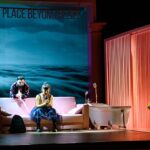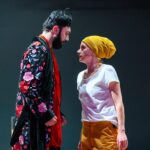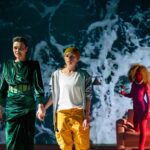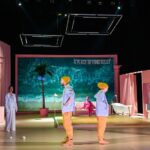October 27th | 21:00 – I.L. Caragiale National Theatre Bucharest, Studio Hall
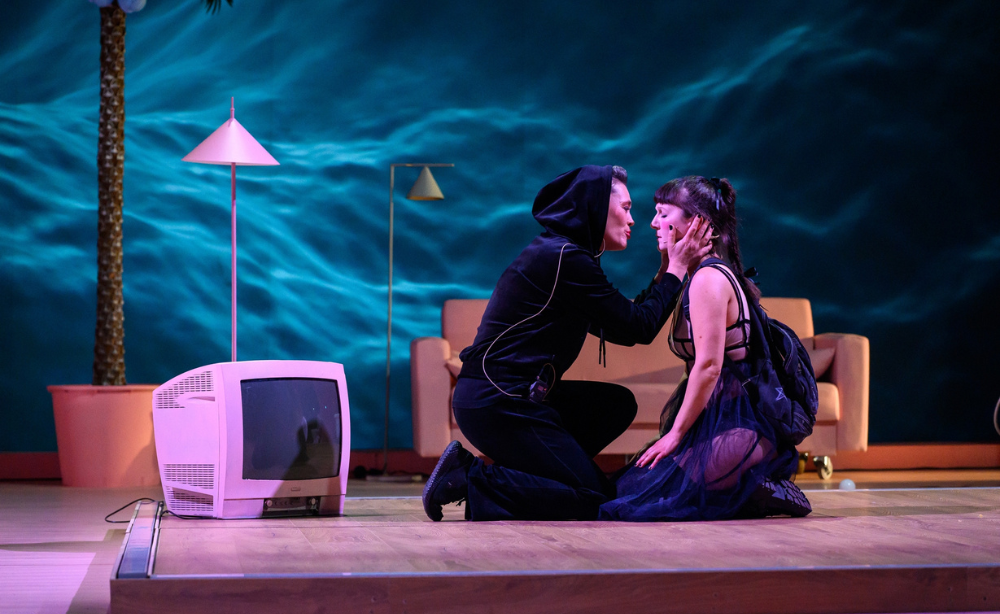
Most likely written in the early 1600s, Twelfth Night or What You Will, is one of Shakespeare’s best-loved comedies, in which love intrigue is interwoven with unexpected identity dramas, setting the humor on the edge of melancholy. Viola, a young girl shipwrecked on the mysterious shores of Illyria, wrongly convinced of the death of her twin brother, decides to mourn disguised in men clothes and thus arouses the affections of the unapproachable Olivia, while she herself pines for her new master, Duke Orsino. The appearance of the lost twin, Sebastian, deepens the confusion and at the same time resolves the protagonists’ romantic dilemmas.
[same_day_events_link]
By: William Shakespeare
Adapted by: Botond Nagy, after the translation of Mihnea Gheorghiu and the translation of Violeta Popa and George Volceanov
Cast:
Orsino, duke of Illyria: Mihai-Florian Nițu
Viola, in love with the duke: Diana Buluga
Sebastian, Viola’s brother: Cosmin Stănilă
Antonio, ship captain, friend of Sebastian: Ruslan Bârlea
Olivia, rich countess: Ramona Dumitrean
Olivia’s shadow: Diana-Ioana Licu
Maria, Olivia’s maid: Cătălin Herlo
Malvolia, Olivia’s quartermaster: Cecilia Lucanu-Donat
Feste, jester: Anca Hanu
Fabiana, Olivia’s special servant: Sânziana Tarța
Sir Toby Belch: Adrian Cucu
Sir Andrew Aguecheek: Radu Dogaru
Police officer: Mihai-Florian Nițu
Directed by: Botond Nagy
Set design: Andreea Săndulescu
Choreography: Andrea Gavriliu
Original music & sound design: Claudiu Urse
Lighting & video design: Cristian Niculescu
Stage adaptation: Ştefana Pop-Curşeu
Assistant director: Diana Mihalașcu
Producer: Lucian Blaga National Theatre, Cluj-Napoca
Duration: 2h 20 min (with intermission)
Recommended age: 14+
Performance in Romanian with English surtitles
Warning! This performance contains strobe light moments and is not recommended for photosensitive people
”In the fairy tales of our childhood, the story usually began with a prince and a princess. They met, fell in love, and lived happily ever after. Love seemed to be such a light, easy thing! Love, life. Everything. Can love be everything? Can love be a revelation today? In our lives, it sometimes seems like we’re constantly stuck in the same cycle. The cycle of depression, failure, a memory that never disappears, not even when we close our eyes. In The Twelfth Night, we speak, first of all, about parallel cycles which are almost complete. Cleansed. Baptised. The Epiphany is the holiday that puts an end to the cycle of 12 days making up the winter holidays, starting with Christmas Eve. In Greek, the word Epiphany means ‘the Lord’s revelation’, i.e., the revelation of the Holy Trinity. John the Baptist, seeing Jesus arrive, tells him: ‘Behold the Lamb of God, who takes away the sin of the world’. Today, how can we wash away our daily sins? Can love be a miracle today? Simone Weil tells us: ‘True love for one’s neighbour means being able to ask them: What is your suffering?‘ It means knowing that the needy exist not as a part of a collection, not as an element of the social category labeled as ‘the needy’, but as human beings, just like us, who were struck by misfortune one day and who were forever and unmistakably affected by it. For this, it is enough and mandatory to look at the needy in a certain way. To look – first of all – with attention, leaving all selfishness aside, to receive the person you see, just as they are, in their whole truth. Only those who are capable of paying attention are capable of looking at people this way”.
I hope this show will remind us of a fragile feeling of forgotten melancholy, a lively melancholy, which makes us want to fall in love with life again and again, no matter the difficulties. To fall in love with the ordinary days when we suddenly remember a long-forgotten dream, in which someone, in an abandoned corner of our soul, comforted us as if it were the first and last time.” (Botond Nagy)
Photo: © National Theatre Cluj-Napoca / Nicu Cherciu


